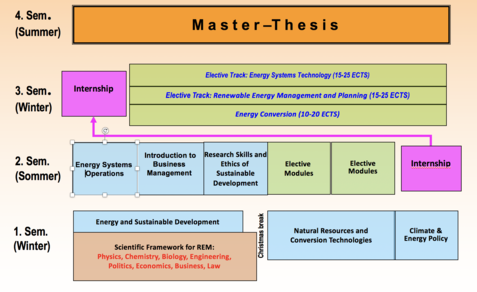Curriculum
The course enables successful students to avail themselves of innovation in the field of renewable energy and to implement the concept of sustainable development for practical business purposes.
The REM coursework is taught mostly in three week modules. This offers the possibility for concentrated work and the integration of a range of teaching techniques.
Students completing the course will have the ability to plan projects and facilities for the utilisation of renewable energy, and to implement them while taking account of economic, political and societal concerns.
Training the student to acquire practical skills is a fundamental aim of the REM degree course. These skills will be attained in the course of project work, internships and in working on practical and relevant themes for the Master’s thesis.

Tried and tested: block modules
Building on long-standing good experience, the “Renewable Energy Engineering and Management“ coursework is very concentrated and is taught mostly in three week modules. Students will not have to listen to conventional lectures from only one tutor, but will instead be taught by teams of lecturers recruited from different departments. Structuring the curriculum into modules offers the possibility for concentrated work and the integration of a range of teaching and learning techniques (role play, papers, team work in small groups).
Elective tracks
We offer two elective tracks in our MSc Renewable Energy Engineering and Managment programme:
1. Energy Systems Technology (e.g. energy systems hardware, energy informatics, smart grids, energy efficiency)
2. Renewable Energy Management and Planning (e.g. decentralized energy systems, landscape and nature protection, landuse conflict, bioenergy, management)
The courses of previously available track Energy Conversion (e.g. photovoltaics, solar thermal energy) are now spread over the third semester and can be taken individually.
International experience
All the lecturers have many years of international experience in their specialist area.
For more information about the contents please refer to the module handbook.

